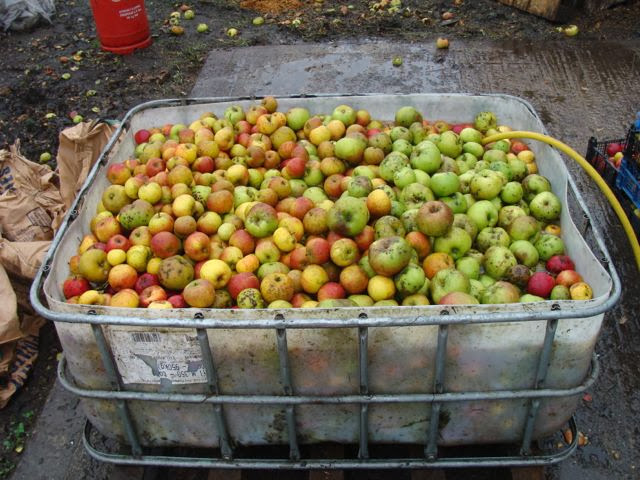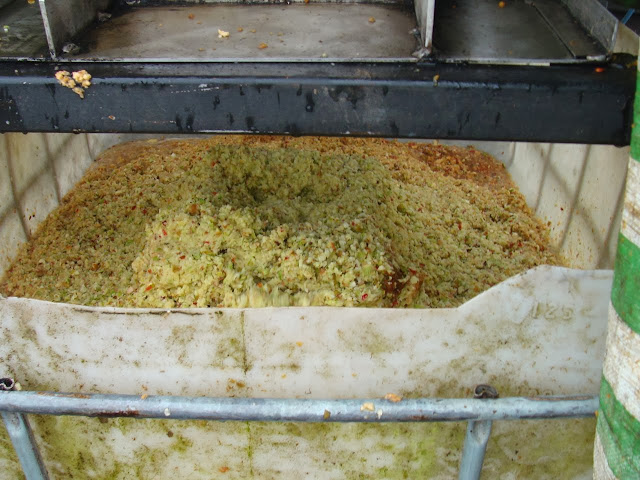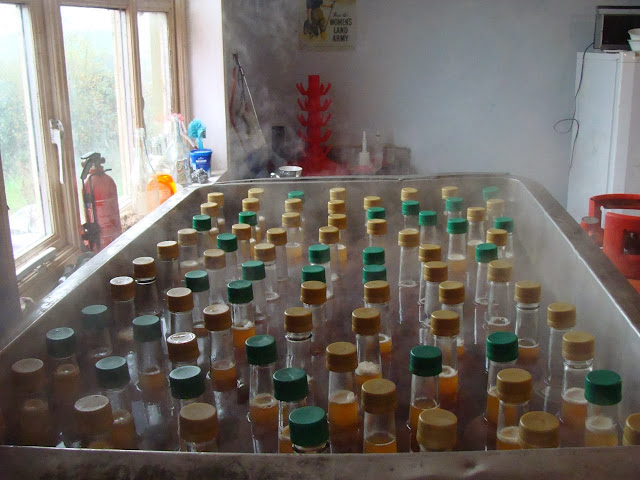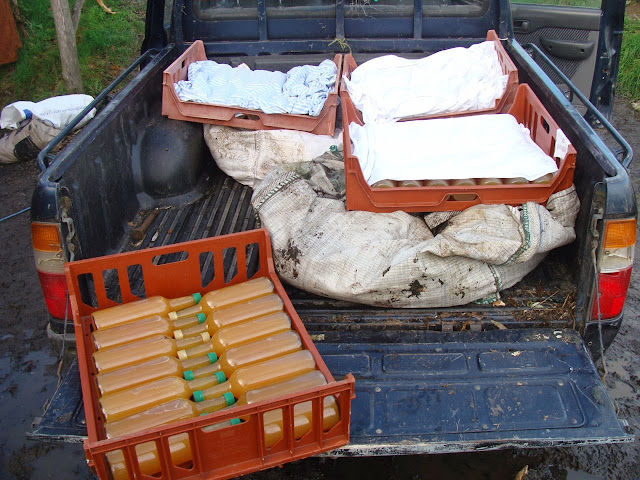 |
| These weren't all of them |
If someone asked you to visualise a third of a tonne of apples, could you do it? I certainly couldn’t. At least not until I began filling empty potato sacks with apples, standing on bathroom scales, subtracting my own weight to obtain the weight of the sack, then multiplying up the number of sacks we filled. Each sack weighed on average 20kg and by the end of several weeks of harvesting we had seventeen of them filled, plus three small crates. 20kg times 17 is 340kg, and since there are 1000kg in a tonne (last time I checked) we had just over a third of a tonne of the fruit, stored with care in an ex-chicken shed.
Monday the 11th of November arrived. Our two-day reservation at the apple-juicing facilities at Fivepenny Farm was finally beginning! I had organised work crews of eager Pilsdonites for both days, and so at 9:30am five of us piled the bulging sacks into the back of our pick-up, crammed ourselves in with our packed lunches and rubber gloves, and set off on the twenty-minute journey along the narrow windy lanes of Marshwood Vale.
We had been expecting to be working together with someone else who was bringing even more apples and splitting the juice proportionally, since the press could cope with an entire tonne of the spherical blighters. But plans change and she had to be in London instead so we had the whole press to ourselves. Thankfully a friend of hers was on hand to show us the ropes as none of us had ever done this before, certainly not on this scale. We were apple pressing virgins and a little nervous.
The press was housed in a beautiful two-storey A-frame thatched wooden building, built quite recently, that provides facilities for the processing of fruit, vegetables and meat for the smallholders in the area who can hire it out for a reasonable fee. The electric pulping machine was kept outside, perhaps because it made such a mess, preferring to hurl the pulp back out the top chute if it could rather than down into the holding bay below. Whilst Joey* gamely balanced on a chair and popped the apples into the thudding contraption with his face averted, Greg and I washed the apples and passed them up to him. Meanwhile Hilda and Yolanda were inside painstakingly cleaning over two hundred used 750ml bottles (there were no new ones available, but at least we got them at half price).
 |
| Feeding the pulping machine |
 |
| Pulp |
 |
| A "cheese" being filled with pulp |
 |
| A cheese half-filled |
Wheeling the pulp holder inside, it was shovelled into a huge thick muslin cloth below the heavy duty press, which was then folded up into a big square, called a “cheese”. Juice was already beginning to leak out of it into the side channels and down through a funnel into a bucket, and we hadn’t even begun to press it. We had enough pulp to fill another cheese on top of the first, and then we heaved on the weighty square top piece, piled on a few blocks of wood where the four other cheeses could have gone, inserted a long steel rod into the gearing and began to turn it clockwise. There wasn’t space to turn it 360 degrees, after each quarter-turn the rod had to be taken out and reinserted back where it had been. Needless to say the last few pushes of the rod were two-man jobs, at full eye-popping strength.
 |
| Joey puts his back into it |
The gushing sweet nectar was pumped into an intermediate tank, filtered through a tap into an open barrel, then pumped again up into another tank positioned ten feet above us. From there it was fed down through a tube into the bottling machine, an ingenious device which took four bottles at a time, automatically filling them on insertion and stopping when full.
 |
| Bottling |
 |
| Bottled |
Once we had eighty brimming bottles the tops were placed loosely on top and each gingerly lowered into a large bath of hot water, heated by five gas hobs. To achieve effective pasteurisation the juice had to reach 76 degrees Centigrade, taking about half an hour, and then whipped out, tops firmly screwed on, and laid to cool horizontally to ensure the lid was also pasteurised by the hot juice. All in all, quite an operation!
 |
| Pasteurising |
 |
| Filling the truck |
By the second day we found ourselves in possession of 221 bottles of delicious pure apple juice with only three breakages (due to the heat of the water), so many that I had to make two terribly cautious journeys home with them, easing the pick-up gently over the potholes listening to the clinkety-clink behind me. But it was all worth it when we sat down to our supper that night with merry jugs of juice instead of tap water. The plan is to sell quite a lot of them at the Bridport Christmas market but the temptation will be to glug it all down before then. Bottoms up!
*All names are made up but references to actual persons and events are completely intentional










2 comments:
How about cider Matt? did you guys try to produce some as well?
Cheerio,
philippe
Would've loved to but Pilsdon is a zero-alcohol community since some of the guests have alcohol dependency issues.
Post a Comment